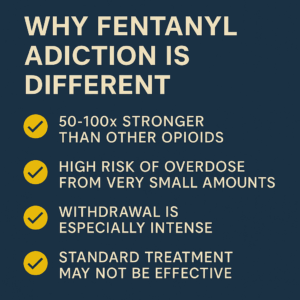When fentanyl enters the picture, everything changes. The way the drug affects your body, the way overdose happens, even the way you detox—it’s all different. So why would treatment stay the same?
If you’ve used fentanyl, even once, you’re not looking at a “normal” opioid recovery path. That’s not meant to scare you—it’s meant to protect you. At Evoke Wellness San Marcos, we’re seeing firsthand how fentanyl changes the rules. And we’ve adapted our care to match.
Let’s break down exactly why fentanyl demands a different approach—and what that means for getting real help that actually works.
Fentanyl Doesn’t Behave Like Other Opioids
Fentanyl is a synthetic opioid up to 50 times more potent than heroin and 100 times stronger than morphine. That’s not just a chemical difference—it’s a behavioral one. The drug floods your brain’s opioid receptors faster and more completely than other substances, which leads to more intense highs—and more devastating crashes.
Because fentanyl is fast-acting and short-lived, users often find themselves needing to dose more frequently. That leads to a cycle of constant use just to feel normal. Your tolerance climbs rapidly, which increases the risk of overdose and deepens dependence far more quickly than other opioids.
It’s not just that fentanyl is stronger. It’s that it rewires your brain faster, harder, and more aggressively.
The Overdose Risk Isn’t Just Higher—It’s Different
Fentanyl overdoses happen differently than other opioid overdoses. Because of its potency and how quickly it takes effect, a person can go from conscious to unresponsive in a matter of seconds.
What makes this especially dangerous is that fentanyl is often mixed with other drugs—cocaine, meth, counterfeit pills—without users knowing. That means someone might think they’re using a small amount of one drug, when they’re actually ingesting a lethal dose of fentanyl.
Even naloxone (Narcan), the emergency medication used to reverse overdoses, may require multiple doses when fentanyl is involved. And even then, a person might need further medical attention to avoid respiratory failure or long-term brain damage.
If you’ve survived a fentanyl overdose, that alone is a reason to act now. Every moment matters.
Detoxing from Fentanyl Comes with Its Own Set of Risks
Fentanyl withdrawal doesn’t just mimic other opioid withdrawals—it magnifies them. Symptoms typically begin within hours and can include:
- Intense muscle aches
- Nausea and vomiting
- Anxiety and restlessness
- Severe insomnia
- High blood pressure
- Suicidal thoughts or depression
In some cases, symptoms temporarily ease before coming back in full force—a second wave known as rebound withdrawal. This can catch people off guard and lead to relapse, even if they made it through the first few days.
And because fentanyl binds so tightly to opioid receptors, some medications used in detox (like buprenorphine) need to be carefully timed. Otherwise, they could trigger precipitated withdrawal—an abrupt, extreme form of withdrawal that can be medically dangerous.
This is why medical detox matters. As part of comprehensive Fentanyl Addiction Treatment in Texas, Evoke Wellness San Marcos monitors your body’s response hour by hour, adjusting treatment to make detox not only safer but actually survivable.
Treatment Has to Adapt—or It Won’t Work
Traditional opioid treatment models often fall short when it comes to fentanyl. The timelines are too short. The medication strategies are outdated. And the therapeutic approaches might not address the kind of trauma fentanyl use leaves behind.
What does effective fentanyl addiction treatment require?
- Longer stabilization periods. Your body may take weeks, not days, to begin resetting.
- Medication-assisted treatment (MAT) protocols tailored for fentanyl. Not just methadone or buprenorphine, but timing and dosage strategies built around fentanyl’s half-life.
- Trauma-informed care. Many fentanyl users have experienced extreme emotional, physical, or systemic trauma.
- Therapy that matches the pace. Fentanyl recovery can involve heavy emotional shutdown. We work at your speed, not ours.
At Evoke Wellness San Marcos, our team builds treatment plans designed for what fentanyl actually does—not what textbooks say opioid use looks like.
Finding the Right Program in San Marcos, TX
You deserve more than a generic plan. You deserve a team that understands what fentanyl use really looks like—and how to help you come back from it.
At Evoke Wellness San Marcos, we offer:
- 24/7 medical detox center with fentanyl-specific protocols
- MAT options adapted to your body’s needs
- Therapists trained in trauma and fentanyl recovery
- Continuing care that helps you stay supported post-discharge
You don’t have to fake readiness. You don’t have to be sure it will work. You just have to be willing to start.
FAQs About Fentanyl Addiction Treatment
What makes fentanyl addiction harder to treat than other opioids?
Fentanyl’s high potency and short duration lead to faster tolerance and deeper dependence. It often requires more intensive detox and longer-term treatment.
Can I use buprenorphine or methadone if I’ve used fentanyl?
Yes—but timing matters. These medications must be introduced carefully to avoid precipitated withdrawal. A medical team should supervise your induction.
Is fentanyl withdrawal dangerous?
Yes. While rarely fatal on its own, fentanyl withdrawal can be physically intense and emotionally overwhelming. Medical supervision is highly recommended.
How long does fentanyl stay in the body?
Fentanyl has a short half-life, but its effects linger in fat tissues. Withdrawal symptoms can last longer than expected, sometimes weeks.
What if I tried treatment before and it didn’t work?
Many people find that standard treatment models aren’t designed for fentanyl. You’re not broken. You just need a program that actually fits your experience.
Ready to Talk?
If you’re scared to make the call, that’s okay. We’ll meet you there. Call us at (888) 450-2285 or Contact Us.
At Evoke Wellness San Marcos, we’re ready to help you take the first step—on your terms, in your time. But don’t wait too long. Fentanyl doesn’t.



